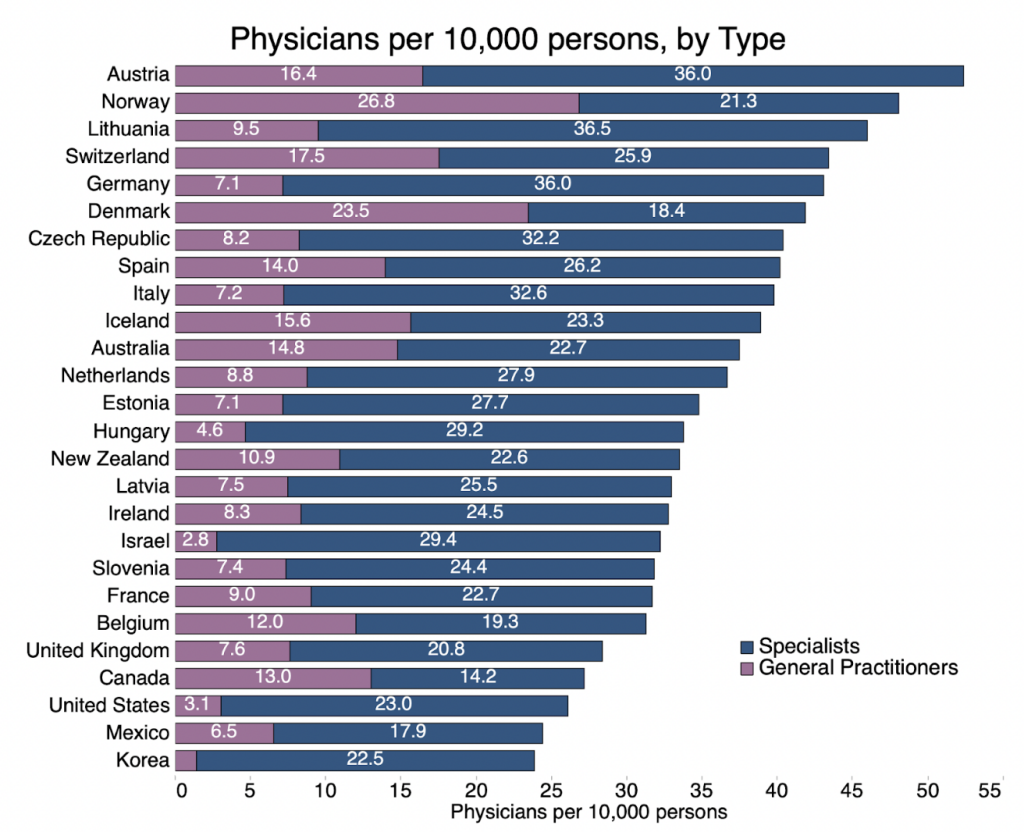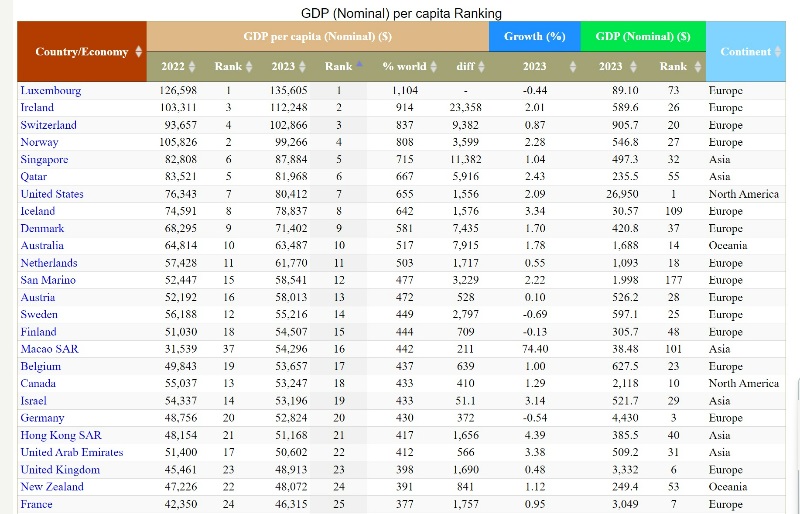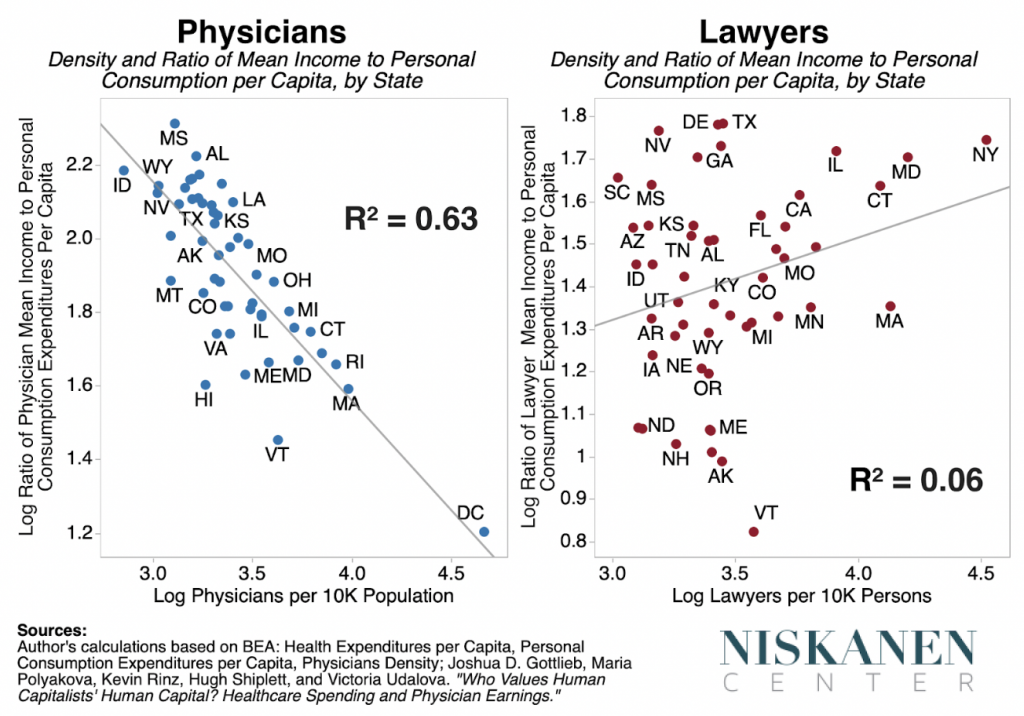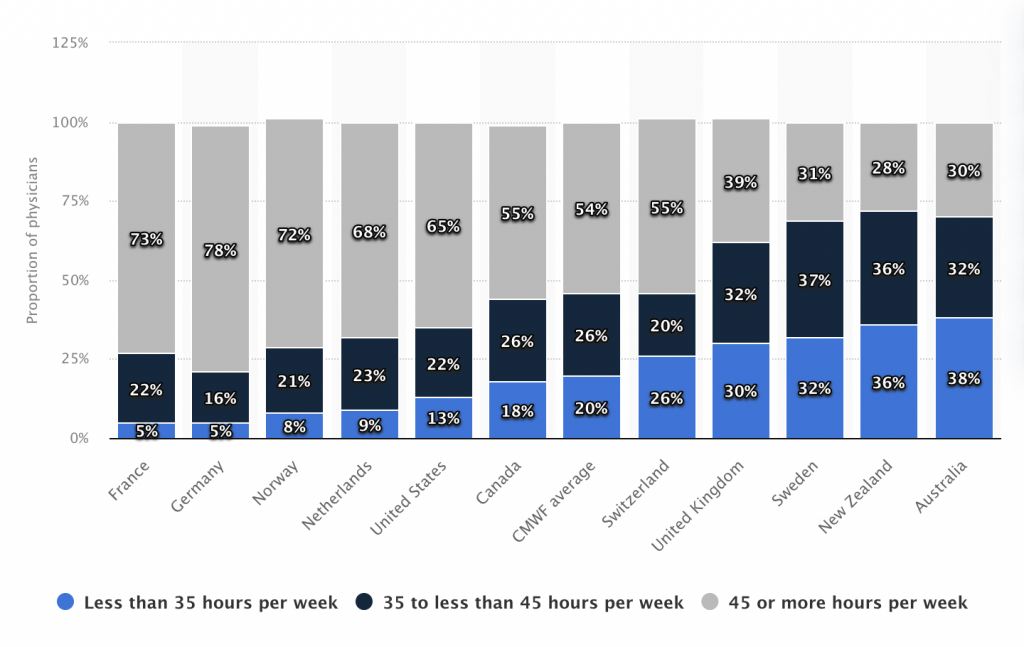 By Dr. Jim Dahle, WCI Founder
By Dr. Jim Dahle, WCI FounderI find it fascinating and a bit nonsensical to see so many articles out there arguing that US doctors are overpaid. Usually, this shows up in an article talking about how expensive healthcare is in the United States. A good example is an article from NPR a few years ago titled “Are Doctors Overpaid?”
“Some people view Match Week as a beautifully engineered dance between supply and demand that ensures the best and brightest learn how to be good doctors at top hospitals. Others, like Dean Baker, Senior Economist at the Center for Economic and Policy Research, say this residency system makes healthcare dramatically more expensive for Americans. A 2011 study in Health Affairs found American doctors, who make an average salary of almost $300,000, are paid around twice as much as doctors in other rich countries.
Baker says ‘doctors are seriously overpaid' and a big reason is rules that restrict the number of people who can get residencies. He calls these rules the work of ‘a cartel,' and in economics, those are fighting words. A cartel limits the supply of something in order to increase the amount of money they can charge.”
Want to get even more fired up? Try this one from the Daily Iowan in 2021 titled “The Curious Case of the Overpaid American Physician.” A few excerpts:
“The US does not have enough doctors, and the shortage is contributing to the high costs patients pay when they go to the hospital. Compared to other industrialized countries, the US ranks near the bottom in supply of doctors—only 2.6 doctors per 1,000 patients. In contrast, most major economies in the European Union, such as Germany and France, have nearly double the number of doctors we have per 1,000 patients . . . This is largely due to high barriers of entry such as an incredibly limited number of spots in medical school and regulations that protect physicians from competition in the form of nurse practitioners and immigrant doctors.
Along with the complicated workings of our private insurance system, the shortage of US doctors is the best elucidation to why they are overcompensated compared to their European counterparts. For example, doctors earn $138,000 in the UK compared to the $316,000 U.S. doctors make . . .
Even if the US were to establish a system in which Medicare were the sole insurer in the market, overall healthcare costs would still exceed those of fellow industrialized nations because of the high salaries to which US doctors are accustomed. In the mainstream debates surrounding our healthcare systems, the problem overlooked by both proponents of private and single-payer healthcare systems is the supply of doctors and their high salaries. These salaries end up contributing significantly to the financial costs patients face.
The rest of the union should follow the lead of states like Iowa and allow nurse practitioners to open up general practices to compete with doctors. These recommendations will make up for the shortage of doctors we have in the current system and drive down costs for patients in a future single-payer system.”
Why US Doctors Earn More
There's no doubt that US doctors do earn more, on average, than international doctors. There are actually a fair number of reasons for this. Let's go through them.
#1 Everybody Gets Paid More in the US
Newsflash! Tons of people want to come to the US because it's awesome and the jobs pay great. Look at average incomes in various countries in the world. Here are the top 25 countries in the world by GDP per capita (via Statistics Times).
Do you see any large countries above the US? No. The US comes in seventh. Seventh out of 195 countries and first among the big countries. Any comparison to the rest of the world of ANY profession is going to make the US look like those professionals are overpaid. Consider the countries to which the US is often compared:
- 10th: Australia
- 18th: Canada
- 20th: Germany
- 23rd: UK
- 34th: Japan
Nobody ever wants to compare us to doctors in Singapore or Qatar for some reason. And no, the US is NOT the country in which doctors are paid the most. It's Luxembourg.
Incidentally, the US ranks No. 9 for attorneys, No. 1 for pharmacists, No. 1 for tech workers, No. 3 for engineers, No. 5 for accountants, No. 4 for financial analysts, No. 5 for professors, No. 9 for teachers, and No. 2 for firefighters. Should I go on, or have I made my point? Quit picking on the doctors. Just about everybody gets paid more in the US. Or do you think we should pay teachers and firefighters less?
#2 It Costs More to Become a Doctor in the US
We've all met doctors who went to school in a foreign country, and none of them ever seem to have student loans. Yet we keep meeting US docs who owe $200,000, $300,000, $400,000 or more in student loans. Why is that, do you suppose? There are numerous free and nearly free medical schools all over Europe. Some top German universities are free. The most expensive one I could find was €6,000 a year. Russia, Bangladesh, Romania, and China are all about $3,000 a year. Korea ($6,000) and Singapore ($10,000) are expensive by comparison but a bargain when compared to the US. Most US students are paying $30,000-$80,000 a year in tuition alone, and they go to school for longer (the whole process is 1-2 years shorter in Europe). Guess what? When it costs more, it should pay more.
#3 Risk
Where else do doctors routinely get sued for hundreds of thousands or even millions of dollars? Oh, nowhere it turns out. It is a little worse in China. You can go to jail for three years for malpractice. You can also go for seven years just for cheating on an exam there. For the most part, doctors in other countries rightly worry far less about lawsuits. If you want people to do something that is high risk, you need to pay them a lot to do it. I know lots of doctors who would be willing to be paid less if it also reduced their chances of a lawsuit.
#4 Fewer Doctors per Capita
There are fewer doctors in the US per capita than in many countries. See this chart from the Niskanen Center.
While critics say that is because doctors artificially keep the numbers low cartel-style, the truth is that it is a long, expensive process to train a doctor. The rate-limiting step is not medical schools—they have increased enrollment in recent years. It is residency training, and in the US, that is mostly paid for by the federal government. If taxpayers want to train more doctors, they certainly can. Most residencies would love to add a few spots. It's obviously not a profitable activity or hospitals would be starting residency programs and hiring residents left and right even without Medicare funding. Want cheaper doctors? Make more doctors. It seems silly to blame the doctors for this one, though.
#5 US Doctors Specialize More
US doctors specialize more. Look at that chart above. Compared to most countries, we have far more specialists than primary care doctors. In reality, we don't have a doctor shortage. We have a primary care doctor shortage. Want more primary care doctors? Pay primary care doctors more, not less, and you'll have them. People respond to incentives, and even medical students are people. At any rate, specialists get paid more than primary care doctors (for various reasons including more risk, hours, and length of training), so when you have more specialists, you should expect to see higher average incomes. I bet if we compared primary care doctor incomes across the world, you wouldn't see anywhere near the disparity people like to point out.
#6 We Live in Rural Areas
There are a lot more rural areas in the US than in other countries. Unlike most professions in the US, doctors get paid more when they live outside the large cities.
That makes them cost more on average. The US is 17% rural—which puts it at 40th on the list, well behind many other developed countries. The US is nearly tied with Canada, which is basically mostly wilderness. It has more area and 10% of the population.
#7 We Work More
Even our primary care doctors work more than those in most other countries.
Specialists also tend to work more on average. Vascular surgeons average almost 900 more hours a year than family practitioners, according to the JAMA Network.
Since we have a high percentage of specialists in the US, it stands to reason that we work more hours in the US. When you work more, you should get paid more. I guess it makes sense. Since there are fewer of us per capita and since Americans don't seem to be any more healthy than those in other countries, we have to work more to take care of all those people.
More information here:
Why American White Coat Investors Should Count Their Blessings
Financial Lessons from a Retired Economist and Current Medical Student
Why Cutting Doctor Incomes Doesn't Move the Needle
I think it's pretty clear why doctors get paid more in the US than in other countries, so I think we can quit using that as an argument to cut doctor pay or as an excuse for our healthcare spending problem. It's not like just cutting physician pay will somehow dramatically reduce the cost of healthcare anyway. Doctor salaries account for just 8% of the healthcare dollar. Let's say you cut all of their pay by 25%. US healthcare spending by capita is $12,000 now. If you cut doctor's pay by 25%, it would still be $11,760. You'd only save $240 per person per year.
It's like the argument I'm always hearing that the reason healthcare costs so much in the US is because of that darn ER. Well, emergency department spending accounts for 2%-3% of the healthcare dollar. Again, somehow magically cut that spending in half, and what do you save? One percent. The American College of Emergency Physicians estimates that about 10% of visits to the ED are unnecessary. I'd say that's about right. So, we're talking about cutting spending by 0.2%. We're talking about $24 per person in the US. It's not going to move the needle.
What will move the needle? Why don't we start with insurance companies. For every dollar they take in, they spend only 80 cents on healthcare. That means 20% of your healthcare dollar is going to insurance costs and profits. Of the remaining 80%, 22% goes to prescription drugs (I bet we could find some savings there), and 42% goes to hospitals for inpatient and outpatient services (I bet we could find some savings there, too). Just because doctors are the most visible part of the healthcare system doesn't mean that's where the money is going.
Consider a typical ER bill. You might pay $4,000 and only $400 of it goes to the doctor. Consider a surgery. The hospital might get $50,000 and the surgeon might only get 1% of that. It's not uncommon at all for the anesthesiologist to make more than the surgeon on a procedure. But even if you put them together, it's a tiny percentage. An appendectomy pays a surgeon only $623, for instance, and that's before any overhead, which is often 60-70%.
More information here:
Living Our Lives in a Dual-Physician Income Household
The Lifestyle of Doctors Worth About $50 Million and How They Made So Much Money
The Bottom Line
Doctors get paid more in the US because they should get paid more in the US. Any argument otherwise is disingenuous. Physician incomes are not even in the top five reasons for runaway healthcare costs in this country. Stop blaming the doctors.
What do you think? Why do you think doctors get paid more in the US than in most countries? Is that appropriate or not? How long would you practice medicine for if your income were cut in half? Would you have still gone to medical school if there had not been the promise of a high salary at the end?




